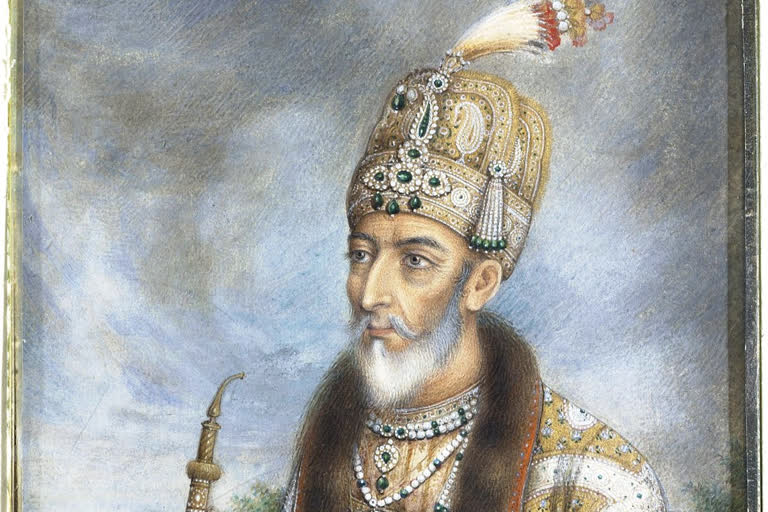New Delhi: As the country celebrates its 75th year of independence for British Rule, ETV Bharat in a special series looks back at the historic moments and personalities who played key roles in India's long struggle for freedom. In this series, we will explore the life and times of the last Mughal emperor Bahadur Shah Zafar, who died a heartbroken man in Burma (now Myanmar).
Bahadur Shah Zafar, the last Mughal emperor, who rose against the mighty East India Company rule, continues to inspire and instil courage among the Indians. As the emperor of India, he could have shown his loyalty towards the British and could have continued to enjoy the lavish lifestyle of the Mughals. However, the last Mughal emperor opted for a difficult path and sought freedom for the country.
The British rules in India saw this as a revolt against the British empire and took revenge by committing atrocities on the civilians. The last Mughal emperor, who had a poetic nature, was subjected to several atrocities in jail after his capture. It is said the once the old man felt hungry and asked for food. The British cut off the heads of his sons and served them on a plate. The British also hanged the dead bodies of his sons in Delhi Gate for the general public to witness. Delhi Gate is still present and under the management of the Archaeological Survey of India.
Read: 100th Anniversary of Wagon Tragedy: A scar of Malabar rebellion
Bahadur Shah Zafar was born on 24 October 1775. He was 82 years old when he accepted the leadership of the rebel soldiers fighting against the British during the First War of Independence in 1857. His father was Akbar Shah II and his mother was Lalbai. After the death of his father, Bahadur Shah Zafar became the Mughal emperor on 18 September 1837. Till then the Mughal Sultanate had become very weak and the emperor was reduced to a nominal position.
The Sepoy Mutiny of 1857, which started from Meerut, proclaimed Bahadur Shah Zafar as the leader of the revolt. However, this short-lived First War of Independence was crushed by the British rulers with superior military tactics and political diplomacy, which saw several Indian states supporting the British in crushing the rebellion. Poor old Bahadur Shah Zafar had to take refuge in Humayun's tomb. He was later arrested as part of a conspiracy by British officer William Hudson.
The British slapped sedition and murder charges against Bahadur Shah Zafar. After 40 days trial, on March 9, 1858, a British court declared Bahadur Shah Zafar guilty of rebellion, treason, and murder before exiling him to Rangoon in the then British-controlled Burma. Many historians say that reason behind this was that if he was kept in India, Zafar might have become the centre of rebellions.
During the days of exile in Burma, the last Mughal emperor had only one medium to express his feelings and that was through his poetry. However, the British made him crave for pen, light and even paper in jail.
Zafar wrote his ghazals on the wall by using bricks. Bahadur Shah Zafar had a deep love for his country. His last wish was to be buried in Zafar Mahal in Mehrauli, but his wish remains unfulfilled to date. On 7 November 1862, the last Mughal Emperor died lonely in Rangoon's prison and was buried there in a cemetery.
Read: How fiery Jharkhand Tribals forced the British Army to drop their weapons
The British feared that if the news of his death spread in India, the rebellion might once again flare up. Therefore, all the rituals of his burial were performed secretly. In 1907, Zafar's grave was marked and an inscription was placed there, but during excavation in 1991, it was found that the actual grave was 25 feet away from the spot. This grave is called the Dargah of Zafar and the Bahadur Shah Museum Committee maintains the sites related in Myanmar today.
Today, the last Mughal emperor Bahadur Shah Zafar is highly respected in India. There are several roads and parks named after him in Delhi. There is also a road named after him in Lahore, Pakistan. Bangladesh has also renamed Victoria Park in Dhaka as Bahadur Shah Zafar Park.
In the words of eminent historian William Dalrymple, the author of The Last Mughal, "Zafar was a remarkable man. A calligrapher, notable poet, Sufi Pir, and a man who valued the importance of Hindu-Muslim unity. While Zafar was never cut out to be a heroic or revolutionary leader, he remains, like his ancestor Emperor Akbar, an attractive symbol of Islamic civilisation at its most tolerant and pluralistic."



